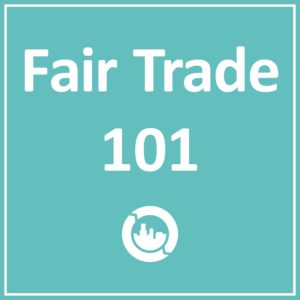Fair Trade Bananas and Young Leadership in the Dominican Republic
Did you know that the Dominican Republic is the largest exporter of organic bananas?
In March, Fair Trade Towns USA sent 12 volunteer organizers on a 7 day learning tour of Fair Trade farms in Dominican Republic. The travelers came from town and city campaigns all over the country to see the effects of their hard work visiting cocoa, coffee and banana farms, as well as a sweat-free apparel factory. This blog post comes to us from Margo W. Druschel of Mankato Area Fair Trade. Margo’s blog takes us through our visit to a Fair Trade and organic banana cooperative.As we gathered in the shade of the mango trees behind the offices of the Los Taínos Agricultural Cooperative, COOPPROBATA, in Azua, Dominican Republic, I was immediately struck by the number of young men in the leadership group. Jose Gomez is an engineer and the Director of Certification Compliance and Quality. Luis de la Cruz is also an engineer and the Supervisor of Production. Each of them attended university on a full-scholarship paid for by the Fair Trade Premium. They have returned to work for the cooperative that sponsored their education and to which they are dedicated.
Yoel Tejeda, the General Manager of the group explained that COOPPROBATA is made up of 223 farmer/producers and 79 other employees. They are certified as Fair Trade by FLO and they use organic farming methods to produce bananas for the European market under the label of Horizontes Organicos.
On the day of our visit, we met with members of the leadership group who described for us some of the benefits of the Fair Trade Premium:
- Healthcare for farmer/producers and their families, office and production staff.
- Education, including 7 students who are on full-tuition scholarships to university at present. Physical Education and Gender Equality curriculum developed for the schools.
- Labor protections: funding for training in safety and for a campaign against child-labor
- Environmental conservation and training in erosion-prevention and solid waste disposal.
- Literacy Campaign and adult education classes.
The use of the premium is decided on by the General Assembly in which all the growers are represented. Committees in the areas of health, education, environment and labor consider requests from individual producers and their communities and make recommendations to the General Assembly.
After lunch we toured a nearby banana farm with Jose, Luis, and Alcedo Beltre as our guides. We observed the Processing Center, where just yesterday enough bananas to fill a refrigerated semi-trailer. The men spoke of their dedication to worker safety and showed us the safety signs. They also described training paid for with the Fair Trade premium, which teaches workers about both quality and safety.
We walked together through the banana forest where we observed a lush, diverse growth of mango, avocado, climbing and trailing flowers and many banana trees. Jose and Luis proudly showed-off their bananas and described how using organic methods, their bananas were of the highest quality, and safe for workers and consumers. Their knowledge and expertise as well as their passion for Fair Trade Organic fruit were inspiring! At the end of our time together Jose said, “Luis and I have spent a great deal of time with growers in the fields, so we know their concerns. We are grateful for your visit to our co-op. Your visit and interest in COOPPROBATA encourages us and reminds us that we are not sacrificing alone. The impact of Fair Trade helps our entire communities, not just the co-op members, to grow and develop. Conscious consumers will be our support. We are encouraged and engaged by this knowledge.” Luis warmly invited us to “Come again soon!”







You must log in to join the discussion. If you are not already a member registering is easy.